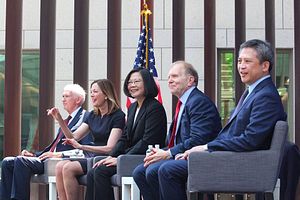The U.S. Department of Defense (DoD) attracted the attention of Hong Kong newspaper South China Morning Post — and likely the ire of the People’s Republic of China (PRC) — with its June 1 Indo-Pacific Strategy Report. Released to coincide with the Shangri-La Diaogue, the Strategy Report refers to Taiwan as a “country,” one of a vanishingly few such mentions of Taiwan since U.S. recognition of the PRC. The first official PRC media release, reposted on Xinhua from the People’s Liberation Army Daily 12 days after the report’s publication, shows China assiduously avoiding any mention of the offending sentence.
Such a reference may seem insignificant to outsiders, but as Defense Department official Randall Schriver explains: “The Chinese Communist Party seeks to diplomatically isolate Taiwan by stripping away its diplomatic allies.” Indeed, Beijing insists the island of Taiwan is part of a single Chinese state and seeks to extinguish the government there as an entity separate from the PRC itself. Official U.S. reference to Taiwan as a country flies in the face of this effort.
Subsequent statements by the DoD do not reveal whether the report was an intentional test of Beijing’s tolerance, but it does bring up a good question: considering the PRC’s continuing effort to squeeze democratic Taiwan out of existence — along with a redoubled determination to oppose the United States and the international system — is it time for the United States to recognize Taiwan?
Over the past decade, Beijing has more aggressively constricted Taipei’s international space. This constriction is most obvious in reducing the count of nations that recognize Taiwan’s government, but includes a wide variety of other areas, everything from meddling in Taiwan’s elections to threatening its airspace.
For America’s part, its relations with the PRC — including switching recognition away from the Republic of China in 1979 — are founded upon a peaceful settlement between Beijing and Taipei as embodied in the U.S. statement in the 1972 joint communique:
The United States acknowledges that all Chinese on either side of the Taiwan Strait maintain there is but one China and that Taiwan is a part of China. The United States Government does not challenge that position. It reaffirms its interest in a peaceful settlement of the Taiwan question by the Chinese themselves.
U.S. president Ronald Reagan was crystal clear on the issue:
U.S. willingness to reduce its arms sales to Taiwan is conditioned absolutely upon the continued commitment of China to the peaceful solution of the Taiwan-PRC differences. It should be clearly understood that the linkage between these two matters is a permanent imperative of U.S. foreign policy.
It is notable how far the United States has backslidden from its commitment to a peaceful resolution to allowing Beijing to strangle Taiwan slowly, while still carefully framing its actions so as not to upset Beijing. Beijing holds no such scruples. Indeed, it appears the “peaceful” solution the Chinese Communist Party seeks is to facilitate Taiwan’s isolation and collapse. The PRC only fears consequences and its continued hostility shows it sees few coming.
But the stakes are far higher than simple U.S. credibility. If the United States allows the PRC to bully and destroy Taiwan, it sets the precedent that power is to be used by larger nations to dominate smaller ones. In a callous world it may be true that might makes right, but this is not the world the architects of the international system left to us, nor is it a world compatible with a strong America. The United States and its many allies uphold a system in which strength is used to prevent domination. It does not dismiss power, but reserves it for this one right use.
Of course, there are many steps Taipei and Washington might take to deter China’s advances. They are already stepping up cooperation. Should Beijing look to deprive Taipei of its diplomatic recognition, it would make sense for the United States to recognize Taipei as the legitimate government of Taiwan, opening a new door where another has closed. A quieter but stronger measure would be seeking a new mutual defense treaty. And if Beijing’s pressure becomes even more severe, Taipei may very well be entitled to develop nuclear weapons under the Nuclear Nonproliferation Treaty. These are steps not to be taken lightly. Indeed, there is no need to take any of them at present. But it is healthy for Beijing to consider these consequences for its increasing and unnecessary threats.
This is not to say that Beijing’s “One China” principle is entirely unattainable. There is surely a form of union under which Taiwan could maintain its current level of self governance while at the same time being part of a greater China. The prospects for One China are entirely dependent on the PRC’s willingness to allow Taiwan to develop peacefully.
Xi Jinping must dispel himself of any notion that subjugating Taiwan under the Party’s “dictatorship of the masses” is acceptable, either in Taiwan or the United States. The world has seen his mockery of “one country, two systems” in Hong Kong, his utter indifference to human rights in China’s western regions, and the faithlessness of China to uphold any promise besides those backed by power. It is tempting to discount the plight of the small before the claims of the great, but be sure: Beijing’s desires will never be sated by appeasement.
The views expressed in this paper represent the personal views of the author and are not necessarily the views of the Department of Defense or of the Department of the Air Force.

































